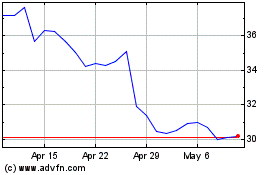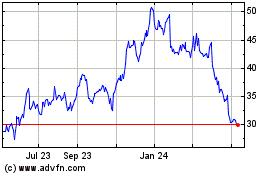By Dylan Tokar
Companies looking to show investors their commitment to
sustainability are relying more on the work of their chief
compliance officers.
The role played by compliance in ensuring that employees act
ethically has a natural place in corporate efforts to attract
sustainability-minded investors, these companies say.
Some compliance executives also have been tapped to help manage
social or environmental goals that go well beyond their role's
traditional remit, as companies look to put muscle behind the
pledges they make on such issues and address legal risks that can
be involved.
"A compliance officer is viewed as a leader in ethics, in good
corporate practices," said Taylor Pullins, a former sustainability
director for Houston-based oil-and-gas producer Noble Energy Inc.
"Right there, they have a role in disclosing internally to
employees and to the market about why they are a responsible
corporation."
In years past, some companies' social responsibility efforts
were often more limited, and public- and investor-relations teams
were tasked with spreading the word on things like corporate
philanthropy. But with many companies now setting broader
environmental, social and governance goals, compliance officers
have taken on a bigger role. Corporate governance experts expect
that involvement to continue, in part due to the legal risks
associated with such commitments.
Regulators in the U.S. and Europe have taken steps to protect
investors from ESG claims that could be viewed as deceptive -- a
practice sometimes called greenwashing.
"Over the last couple of years, [ESG] has become a mountaintop
of risk," said Dave Curran, who leads the law firm Paul, Weiss,
Rifkind, Wharton & Garrison LLP's sustainability practice.
"Lawyers and compliance executives are getting more and more
involved in everything from pressure-testing disclosures, to
analyzing processes and procedures, to tracking, measuring and
monitoring these programs."
Western Union Co. -- whose largest shareholder is BlackRock
Inc., an investment firm that has made sustainability a core goal
-- released its first ESG report in 2019. Last year, it retained a
consultant to further refine its ESG strategy, a process that
involved assessing which issues were most important to stakeholders
and the company's long-term business success.
The company has a smaller environmental footprint than many
others, so it chose to focus on themes such as doing business
ethically and financial inclusion, said Caroline Tsai, who leads
Western Union's legal, compliance and enterprise risk group. That
meant spotlighting the work done by compliance to prevent
money-laundering and report other potentially nefarious financial
transactions, she said.
The legal and compliance function also was instrumental in
developing Western Union's ESG strategy more broadly, including by
advising on metrics to track the company's progress toward meeting
its sustainability commitments, Ms. Tsai said.
"It's a cross-functional effort," she said. "But the lens we
brought to bear in building out a global compliance program -- many
of those learnings and best practices are absolutely applicable to
ESG."
Even at companies that place a bigger emphasis on their
environmental impact, compliance officers are contributing data
about how the company complies with laws and regulations --
information that experts view as falling into the governance bucket
of ESG performance. They sometimes also are asked to chip in on
commitments that fall more into the environmental and social
categories.
Dell Technologies Inc.'s ESG program has four main pillars:
sustainability, diversity and inclusion, social philanthropy, and
ethics and privacy. Chief Ethics and Compliance Officer Michael
McLaughlin is responsible for ethics and privacy.
As Dell's strategy has evolved, Mr. McLaughlin said the
compliance function has gone from primarily being a lawyer for the
company's ESG efforts to taking on its own ethics and privacy
targets. By 2030, for example, the company hopes to fully automate
its data control processes to make it easier for customers to
control their personal data. "My feet are held to the fire just
like everyone else's," he said.
The function also has become involved in helping promote values
from other pillars of the program. This year, the company added a
course on diversity and inclusion to its annual training program,
which is overseen by compliance, Mr. McLaughlin said.
Pushing environmental and social practices down through supply
chains is a challenge for companies looking to meet specific
emissions or diversity targets. It is also an area where
compliance, which regularly vets third parties for legal risks such
as corruption, can help.
Intel has a dedicated supply-chain function that partners with
compliance and others at the company to screen suppliers on a range
of conduct, from emissions and chemicals, to human rights, conflict
minerals and supplier diversity. At companies with less complex
supply chains, such a task can fall more directly on
compliance.
Joe Rodgers, the chief ethics and compliance officer of
power-management company Eaton Corp., said his function has started
screening its agents and distributors for emerging ESG-related
issues such as human rights, alongside compliance risks like
bribery and corruption. The company also incorporates ESG
expectations into its supplier code of conduct, which includes
provision on health and safety, the environment, and labor and
human rights, he said.
Some compliance officers and corporate governance experts think
there is room for compliance to take on an even greater role in ESG
as the function's responsibility for managing nonfinancial risks of
all kinds grows.
With companies taking on more ambitious targets, they need a way
to prove they are actually carrying them out. A robust compliance
team will have a system for embedding controls throughout the
business, and for tracking progress on complying with certain
standards -- whether legal or aspirational.
"It starts with disclosure, but once you've made the disclosure,
you have to demonstrate your compliance with that disclosure," said
Bruce Karpati, the chief compliance officer of the private-equity
firm KKR & Co.
Dieter Holger contributed to this article.
Write to Dylan Tokar at dylan.tokar@wsj.com
(END) Dow Jones Newswires
May 04, 2021 10:14 ET (14:14 GMT)
Copyright (c) 2021 Dow Jones & Company, Inc.
Intel (NASDAQ:INTC)
Historical Stock Chart
From Mar 2024 to Apr 2024

Intel (NASDAQ:INTC)
Historical Stock Chart
From Apr 2023 to Apr 2024
